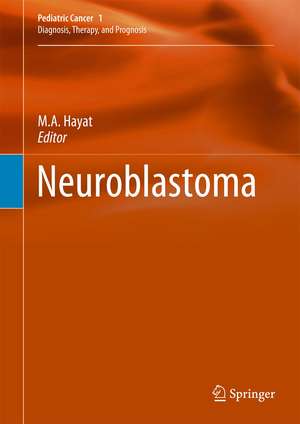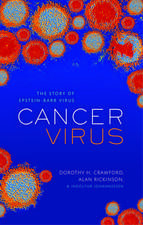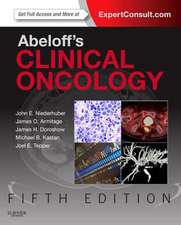Neuroblastoma: Pediatric Cancer, cartea 1
Editat de M.A. Hayaten Limba Engleză Hardback – 3 noi 2011
| Toate formatele și edițiile | Preț | Express |
|---|---|---|
| Paperback (1) | 984.38 lei 38-44 zile | |
| SPRINGER NETHERLANDS – 23 aug 2016 | 984.38 lei 38-44 zile | |
| Hardback (1) | 1105.77 lei 6-8 săpt. | |
| SPRINGER NETHERLANDS – 3 noi 2011 | 1105.77 lei 6-8 săpt. |
Preț: 1105.77 lei
Preț vechi: 1163.97 lei
-5% Nou
Puncte Express: 1659
Preț estimativ în valută:
211.66€ • 229.98$ • 177.91£
211.66€ • 229.98$ • 177.91£
Carte tipărită la comandă
Livrare economică 21 aprilie-05 mai
Preluare comenzi: 021 569.72.76
Specificații
ISBN-13: 9789400724174
ISBN-10: 9400724179
Pagini: 300
Ilustrații: XVIII, 262 p.
Dimensiuni: 178 x 254 x 17 mm
Greutate: 0.7 kg
Ediția:2012
Editura: SPRINGER NETHERLANDS
Colecția Springer
Seria Pediatric Cancer
Locul publicării:Dordrecht, Netherlands
ISBN-10: 9400724179
Pagini: 300
Ilustrații: XVIII, 262 p.
Dimensiuni: 178 x 254 x 17 mm
Greutate: 0.7 kg
Ediția:2012
Editura: SPRINGER NETHERLANDS
Colecția Springer
Seria Pediatric Cancer
Locul publicării:Dordrecht, Netherlands
Public țintă
ResearchCuprins
Preface.-1. Introduction. I Diagnosis and biomarkers.-2. Pediatric cns neuroblastoma: magnetic resonance imaging and spectroscopy.-3. Pediatric neuroblastoma-associated opsoclonus-myoclonus-ataxia syndrome: early diagnosis.-4. Neuroblastoma mouse model.-5. Orbital metastasis in neuroblastoma patients.-6. Pediatric neuroblastoma: molecular detection of minimal residual disease.-7. A comprehensive tissue microarray-based fish screen of alk gene in neuroblastomas. II Therapy.-8. Neuroblastoma: triptolide therapy.-9. Neuroblastoma: ornithine decarboxylase and polyamines are novel targets for therapeutic intervention.-10. Neuroblastoma: antibody-based immunotherapy.-11. Targeting multidrug resistance in neuroblastoma.-12. Neuroblastoma: perspectives for the use of il-21 in immunotherapy.-13. Neuroblastoma: role of hypoxia and hypoxia inducible factors in tumor progression.-14. Neuroblastoma: role of gata transcription factors.-15. Neuroblastoma: role of mycn/bmil pathway in neuroblastoma.-16. Neuroblastoma: role of clusterin as a tumor suppressor gene.-17. Refractory neuroblastoma cells: statins target atp binding cassette-transporters.-18. Neuroblastoma: dosimetry for mibg therapies.-19. Advanced neuroblastoma: role of alk mutations.-20. Pediatric neuroblastoma: treatment with oral irinotecan and temozolomide. III Prognosis.-21. Genomic profiling of neuroblastoma tumors- prognostic impact of genomic aberrations.-22. Neuroblastoma patients: plasma growth factor mildkine as a prognostic growth factor.-23. Pediatric neuroblastoma: role of tgfbi (keratoepithelin).-24. Role of bone marrow infiltration detected by sensitive methods in patients with localized neuroblastoma. Index
Textul de pe ultima copertă
Introduction of new technologies and their applications to neuroblastoma diagnosis, treatment, and therapy assessment are explained. Role of molecular ghenetics in diagnosis and therapy for neuroblastoma patients is detailed. Molecular detection of minimal residual neuroblastoma is described. Magnetic resonance imaging and spectroscopy are detailed for diagnosing this solid, extracranial cancer. Targets for therapeutic intervention in neuroblastoma are identified, including targeting multidrug resistance in this cancer. Ornithine decarboxylase and polyamines are novel targets for therapeutic intervention. The effectiveness of chemotherapy with oral irinotecan and temozolomide is explained. The role of transcription factors (GATA) in neuroblastoma pregression is also included.
Caracteristici
Children with cancer Pediatric physicians Researchers in the field of pediatric cancer Scientists involved in the development of cancer drugs
















